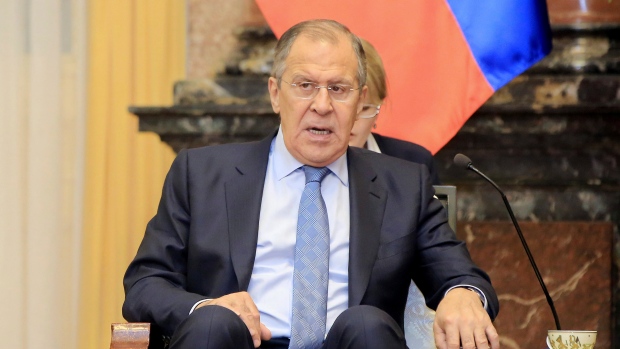Mar 29, 2018
Russia orders 60 U.S. diplomats out in retaliatory move
, Bloomberg News

(Bloomberg) -- Russia ordered the U.K. to make deep new cuts at its diplomatic missions one day after Moscow kicked out 60 U.S. envoys, ratcheting up tensions with the West over the poisoning of a former spy.
The U.K. must cut “more than 50” diplomatic and technical staff at its Russian embassy and consulate within a month, Foreign Ministry spokeswoman Maria Zakharova said Friday by phone. That will reduce staffing numbers to the same level as Russia’s missions in the U.K., she said.
The Foreign Ministry earlier summoned U.K. Ambassador Laurie Bristow to inform him of the demand. It protested against Britain’s “provocative and absolutely unjustified actions” in securing coordinated international expulsions of nearly 130 Russian diplomats this week over the attempt to kill former double agent Sergei Skripal and his daughter Yulia.
The ministry also called in envoys from 25 other states to inform them of tit-for-tat expulsions in response to their support of the U.K. Russia announced the U.S. expulsions and the closing of the American consulate in St. Petersburg late Thursday, mirroring U.S. President Donald Trump’s order to kick out 60 Russian envoys and close its Seattle consulate.
The measures come as the crisis shows no sign of easing over the military-grade nerve-agent attack in the English city of Salisbury that the U.K. and its allies blame on Russia. The Kremlin denies any involvement and has tried to portray the confrontation as one with the U.S. and the U.K. rather than with Europe as a whole.
The U.K. and Russia have already kicked out 23 diplomats each. Russia last year also ordered staff numbers slashed by nearly two-thirds, or 755 positions, at the U.S. embassy and consulates as tensions flared over alleged Kremlin hacking of the 2016 presidential election.
Russia gave the American diplomats until April 5 to leave and warned of additional steps if there are further “hostile actions” against its diplomatic and consular offices in the U.S. Washington has dismissed the notion that Russia’s entitled to take reciprocal action.
“There is no justification for this response” because Russia was “responsible for that horrific attack on the British citizen and his daughter,” State Department spokeswoman Heather Nauert told reporters in Washington. The U.S. isn’t ruling out further steps against Russia, Nauert said.
A QuickTake: Novichok, the Russian Nerve Agent Spooking Britain
The confrontation “looks not so much like a cold war than a fight without rules,” said Konstantin Kosachyov, head of the foreign affairs committee of the Russian upper house of parliament. “One in which the bully himself complains when he gets a taste of his own medicine.”
While the scale of the coordinated action against Russia was unprecedented, the decision of Paris and Berlin to limit expulsions to four diplomats each, in contrast to the U.S., has stoked expectations in Moscow that France and Germany still want to work with Putin.
“The Kremlin is confident that it could reach a deal with Europe if not for the malicious influence of the U.S. and U.K.,” said Valery Solovei, a political scientist at the Moscow State Institute for International Relations.
Trump drew bipartisan praise in Washington this week for the expulsions, days after he was criticized for congratulating Russian President Vladimir Putin on his re-election in a phone call. The American president has been faulted by lawmakers for voicing continued optimism about improving relations with Putin while questioning the finding of U.S. intelligence agencies that Russia interfered in the 2016 election.
(Updates with Foreign Ministry spokeswoman in second paragraph.)
--With assistance from Mike Dorning Larry Liebert Stepan Kravchenko and Olga Tanas
To contact the reporter on this story: Henry Meyer in Moscow at hmeyer4@bloomberg.net.
To contact the editors responsible for this story: Alan Crawford at acrawford6@bloomberg.net, Tony Halpin, Gregory L. White
©2018 Bloomberg L.P.